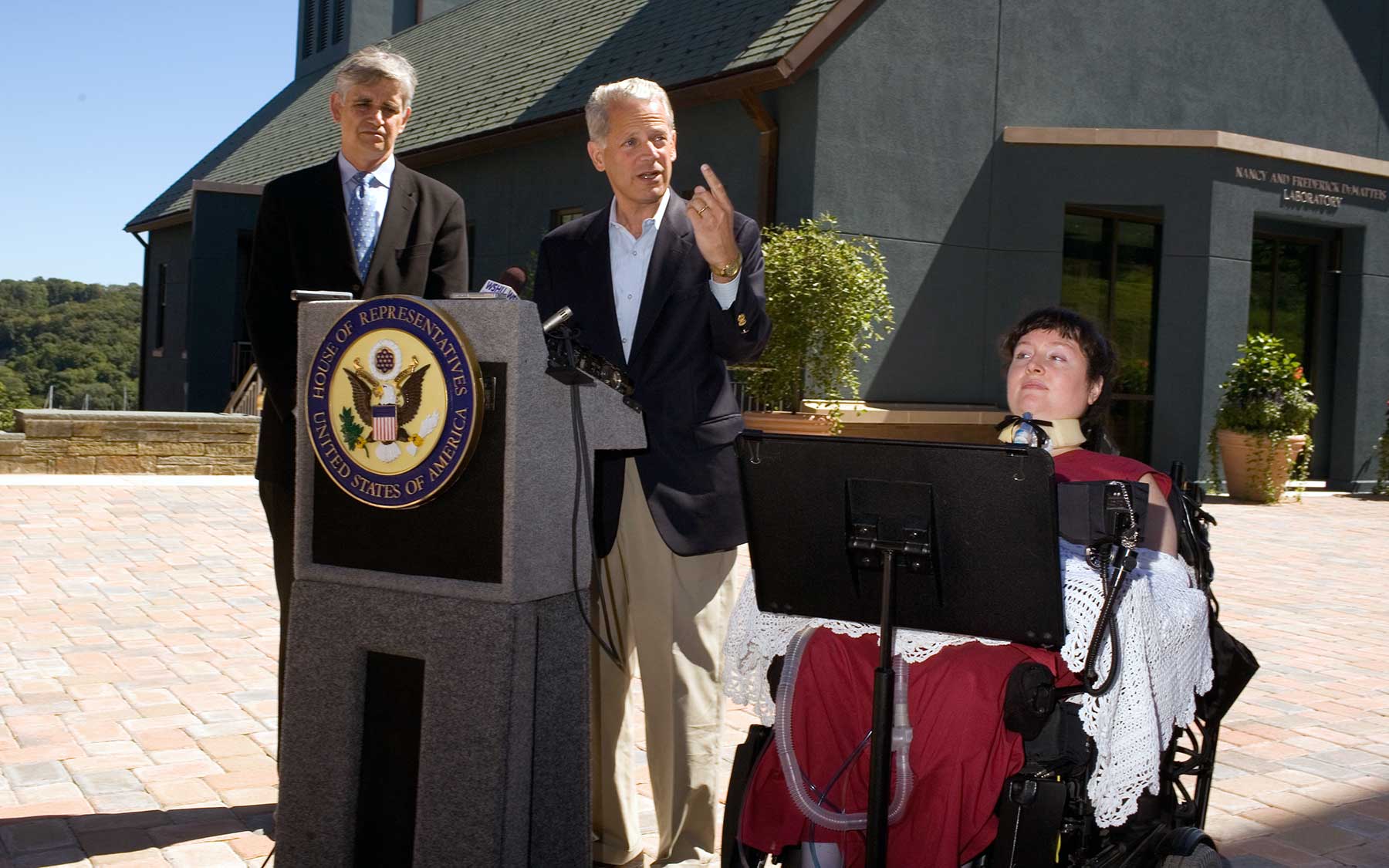A Federal judge’s decision “sets back” vital work and handcuffs American science
Cold Spring Harbor, NY — Against a backdrop of some of the world’s most sophisticated biological research labs, Rep. Steve Israel (D-Huntington) this morning issued a challenge to his colleagues in Congress: immediately upon their return from summer recess, he urged, they should pass legislation that would reverse a recent Federal court decision that has brought embryonic stem cell research in the U.S. to a screeching halt.
Rep. Israel was seconded in his plea by Dr. Bruce Stillman, a renowned cancer researcher and President of Cold Spring Harbor Laboratory, which hosted the Congressman’s announcement to the press this morning. Also lending vocal support was Brooke Ellison, a stem cell research advocate and instructor at Stony Brook University, who, since a car accident in 1990, has been a quadriplegic.
Rep. Israel said the Aug. 23 decision by Chief Judge Royce C. Lamberth of the Federal District Court for the District of Columbia, “sets back research, sets back patients, and sets back jobs,” on Long Island and across the nation. The decision, which prevents federally funded research from being conducted on any embryonic stem cells derived from human embryos, “has not only rolled back the Obama policy on stem cells, but has actually rolled back the Bush policy,” Israel noted.
The Congressman said he regards the legal appeals process too slow, given the gravity of the matter. “I don’t think we should wait for an appeal,” he said. “We’ve got to act, and act fast.” Congress has twice in the past decade passed bills giving the go-ahead for embryonic stem cell research. “The Judge said Congress created the policy, and only Congress can revisit it. Well, I want to take him up on that. When we return to Washington on Sept. 14, the House, as one of its first priorities, should re-pass the very legislation that it has passed twice before.” If passed by the Senate, such a bill would be almost certain to receive a presidential signature, thus ending any ambiguity about the will of Congress, Israel said.
President Stillman of Cold Spring Harbor Laboratory praised Rep. Israel for taking a strong position on the issue and calling for an immediate remedy. “To the scientific community,” Dr. Stillman said, “this judicial decision was an absolute shock. Embryonic stem cells have been studied since the 1980s, and now the work has been forced to a complete stop. The judge’s decision reverses the policies of two presidents, goes far beyond the debate that we’ve seen in this country, and sets a standard that is unique in the world. This is now the only country in the world where you cannot do embryonic stem cell research.”
Dr. Stillman said he believed that bringing the matter before Congress once more “will not only clarify the situation,” but will provide Congress with a golden opportunity “to make a strong statement to the people of this country and to patients like Brooke Ellison, who are counting on steady progress in stem cell research.” The prior passage by Congress of two bills enabling research with embryonic stem cells is evidence of the strong public support that exists for this type of research, Stillman said.
Brooke Ellison, who spoke from her wheelchair, said that “stem cell research has been used as a political see-saw,” subject to the uncertainties of the political process. “But this is not a political, judicial or ideological issue,” she said. “It’s a human issue. One that speaks to the very core of what it means to show basic human compassion.”
Dr. Stillman said that while most work involving stem cells at CSHL was not embryonic stem cell research, any labs in which embryonic cells are used will now be subject to the National Institutes of Health’s recent interpretation of Judge Lamberth’s ruling. He said there was still some ambiguity about whether the interpretation will hold up under inevitable challenge. But the point, Dr. Stillman emphasized, is that science cannot properly proceed and the therapeutic potential of embryonic stem cells cannot be discovered—by researchers working in America—unless research is permitted to proceed in unfettered fashion.
Written by: Peter Tarr, Senior Science Writer | publicaffairs@cshl.edu | 516-367-8455
